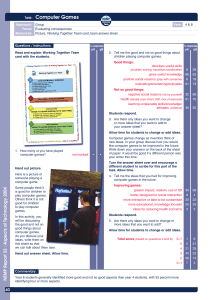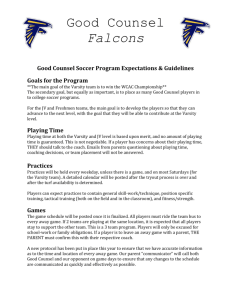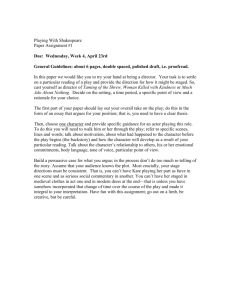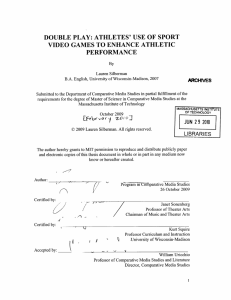My Kid is Going to Make it to the Big Leagues
advertisement
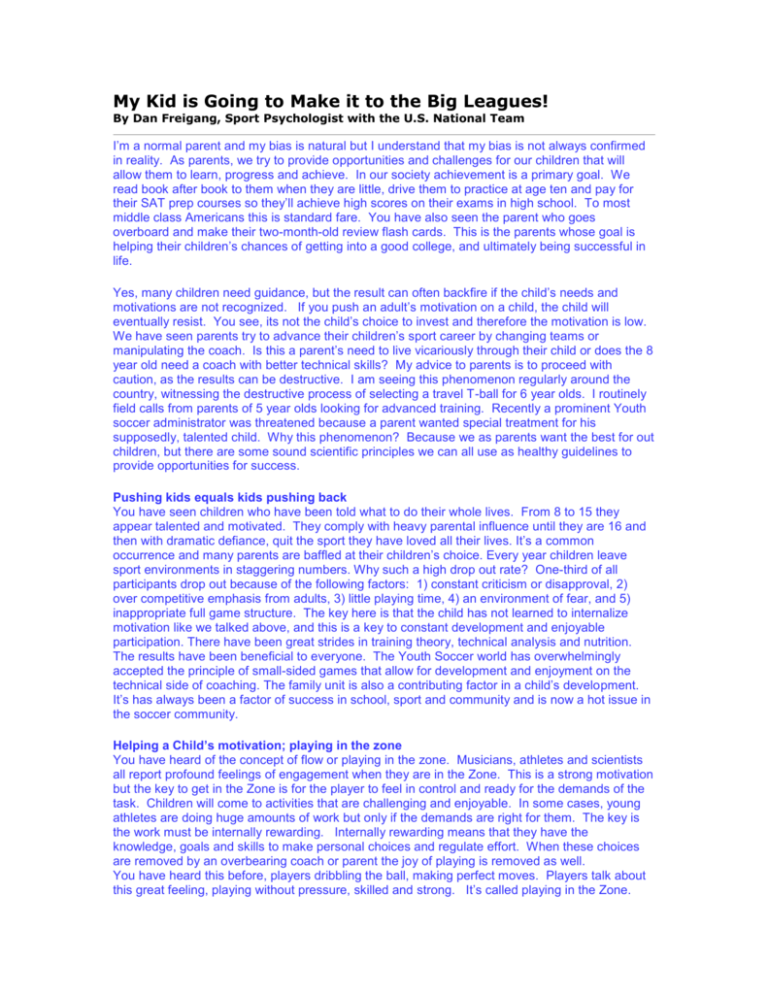
My Kid is Going to Make it to the Big Leagues! By Dan Freigang, Sport Psychologist with the U.S. National Team I’m a normal parent and my bias is natural but I understand that my bias is not always confirmed in reality. As parents, we try to provide opportunities and challenges for our children that will allow them to learn, progress and achieve. In our society achievement is a primary goal. We read book after book to them when they are little, drive them to practice at age ten and pay for their SAT prep courses so they’ll achieve high scores on their exams in high school. To most middle class Americans this is standard fare. You have also seen the parent who goes overboard and make their two-month-old review flash cards. This is the parents whose goal is helping their children’s chances of getting into a good college, and ultimately being successful in life. Yes, many children need guidance, but the result can often backfire if the child’s needs and motivations are not recognized. If you push an adult’s motivation on a child, the child will eventually resist. You see, its not the child’s choice to invest and therefore the motivation is low. We have seen parents try to advance their children’s sport career by changing teams or manipulating the coach. Is this a parent’s need to live vicariously through their child or does the 8 year old need a coach with better technical skills? My advice to parents is to proceed with caution, as the results can be destructive. I am seeing this phenomenon regularly around the country, witnessing the destructive process of selecting a travel T-ball for 6 year olds. I routinely field calls from parents of 5 year olds looking for advanced training. Recently a prominent Youth soccer administrator was threatened because a parent wanted special treatment for his supposedly, talented child. Why this phenomenon? Because we as parents want the best for out children, but there are some sound scientific principles we can all use as healthy guidelines to provide opportunities for success. Pushing kids equals kids pushing back You have seen children who have been told what to do their whole lives. From 8 to 15 they appear talented and motivated. They comply with heavy parental influence until they are 16 and then with dramatic defiance, quit the sport they have loved all their lives. It’s a common occurrence and many parents are baffled at their children’s choice. Every year children leave sport environments in staggering numbers. Why such a high drop out rate? One-third of all participants drop out because of the following factors: 1) constant criticism or disapproval, 2) over competitive emphasis from adults, 3) little playing time, 4) an environment of fear, and 5) inappropriate full game structure. The key here is that the child has not learned to internalize motivation like we talked above, and this is a key to constant development and enjoyable participation. There have been great strides in training theory, technical analysis and nutrition. The results have been beneficial to everyone. The Youth Soccer world has overwhelmingly accepted the principle of small-sided games that allow for development and enjoyment on the technical side of coaching. The family unit is also a contributing factor in a child’s development. It’s has always been a factor of success in school, sport and community and is now a hot issue in the soccer community. Helping a Child’s motivation; playing in the zone You have heard of the concept of flow or playing in the zone. Musicians, athletes and scientists all report profound feelings of engagement when they are in the Zone. This is a strong motivation but the key to get in the Zone is for the player to feel in control and ready for the demands of the task. Children will come to activities that are challenging and enjoyable. In some cases, young athletes are doing huge amounts of work but only if the demands are right for them. The key is the work must be internally rewarding. Internally rewarding means that they have the knowledge, goals and skills to make personal choices and regulate effort. When these choices are removed by an overbearing coach or parent the joy of playing is removed as well. You have heard this before, players dribbling the ball, making perfect moves. Players talk about this great feeling, playing without pressure, skilled and strong. It’s called playing in the Zone. Players talk about the zone in similar ways: “I was mentally clear, my body pumped and I felt like a wizard" "Physically everything came to a peak my play just flowed." "It was fun and felt good” "I was in the zone, I wasn't thinking of anything " "I was completely focused, like my body and mind were in perfect harmony" You have probably experienced this feeling yourself, while you where driving from Seattle to Spokane. Have you ever been driving and thought, “I don’t remember passing that store’, because driving is easy for veterans and when you have a routine task your mind can engage in pleasant thoughts, putting you in the Zone. The key for our children is for parents and coaches to try and set the conditions for players to play in the zone daily. This is a difficult task but new scientific research indicates that we can teach and recreate the conditions for playing in the Zone. This is a really important concept for everyone, especially children. When people feel skilled and in control, they are motivated to continue that particular activity. This is how human motivation works. If children are matched to the right level of skill and focused upon the task they will have some degree of control and competence. If the skill is too difficult the child chokes; too easy a skill and they are bored. Playing in the Zone does something important, it gives motivational control to the child. That’s what we want, to help players to maximize intrinsic motivation. The Athlete Family: the Keys to Success Have you ever totaled up the cost of all your kids soccer experiences? The fees, travel, meals, equipment and time really add up. If you wanted a return on that investment then get yourself a broker and play the stock market. If the rationale for investing your time and money is for the health and the development for your child then the logical extension is to make the home environment conducive to success as well. Healthy development for young athletes requires the family to function at high levels. When we sample and do research with successful people, we find similar patterns in their learning. Yes families from music, politics, art, science and education all have similar patterns of function. Successful athletes usually have family support systems that are complex. Complex, means their families are stable. Stable families are found in both single parent as well as traditional family systems. A stable home is one that allows the child to be safe, disciplined, cared for supported and loved. The child needs to feel wanted and encouraged while in the home. But wait, the athletic family is also a family that encourages curiosity and allows the child to seek out and experience new challenges. Further it is a family that discusses values of achievement, support and progression. The child is encouraged to risk with the blessing of the athletic family. This allows the child to test, play and explore without fear of punishment or failure. The complex home life allows the child to experience control and encouragement in a family safe environment. Having experienced this feeling, the child is then encouraged to test their outside experiences to match their skill, and experience Flow (playing in the Zone) outside the home in activities of their own choice. This is where you hear stories from great athletes talking about training and playing as a profound source of joy. Read the stories of Wayne Gretzky, and Mia Hamm and you will recognize the contribution of stable and encouraging families. When Good Parents Go Bad Perhaps the most common pathway to destruction of a young player is to assume they want the same goals as their parents. Do you remember what the number one motivational factor is for children? It’s not winning or gaining a scholarship, its to be with their friends and have fun. The family can run into problems when the parent’s authority crosses over by defining their children’s motivations. The parent unconsciously usurps control and motivation away from the child. It backfires. You see this often as soon as the game is over and parent begins to coach a child in the car on the drive home. “You should have shot lower”, explains the father. The child’s head lists to the side and their eyes roll back and they can’t wait to get out of the car, “I know Daddy.” This interchange may seem harmless but think about the child’s motivation. If they receive enough adult criticism they will lose control and motivation and the pathway to quitting is established. This is not allowing the child to play in the Zone. Dan Freigang Ph.D. is a sport scientist working with the U.S.S.F. in Sport Psychology. Dan was an international athlete and national team coach and he presents his workshops as a unique blend of scientist and coach. He is currently in private practice and invites your comments and inquiries. Caldan@Earthlink.net (801) 392-4762.
